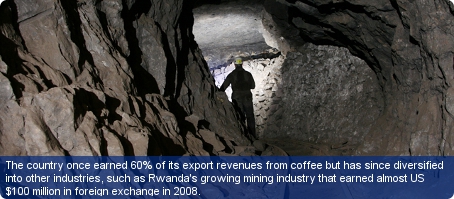Find a business in Rwanda

The landlocked state of Rwanda’s economy is predominately based on agriculture. However, growth in mining activity and in exports of minerals such as cassiterite, coltan and wolfram reduced the country’s dependence on produce such as coffee and tea. It has a GNI per capita of US$600 (2010), but it has seen a GDP growth of 8.2% per annum (2008-12). After 1994, there was large-scale privatisation in the utilities, transport, and mining sectors and the emergence of new industries such as eco-tourism. Africa’s most densely populated country is trying to overcome the limitations of its small, landlocked economy by leveraging regional trade.
Rwanda’s agriculture industry employs almost 90% of the country’s working population, and contributes around 34% of the country’s GDP (2010). The sector also generates around 70% of export revenues and 90% of the national food requirements (2008). Main produce includes sweet potatoes, cassava, potatoes, dry beans, corn, sugarcane and sorghum. Coffee contributes significantly to the economy, and coffee and tea exports together contribute the most towards the country’s export earnings. Bananas are one of the major commodities in Rwanda’s agricultural sub-sector, and are used as cash and food crops. Despite Rwanda’s fertile ecosystem, food production often does not keep pace with demand, requiring food imports.
Rwanda has a natural reserve of methane gas in Lake Kivu; it is estimated that the lake has 56.63 billion cubic metres of proven natural gas reserves (January 2011 estimate). The resource is equally shared between Rwanda and the Democratic Republic of the Congo (DRC) and development initiatives are being undertaken to explore this underutilised natural resource.
Mining’s contribution to Rwanda’s GDP has historically not been significant; however, the National Bank of Rwanda noted that in 2007 mining activities rose by 38.9%. Rwanda’s main mineral exports are ores processed to extract tin, coltan and tungsten. According to Rwanda’s development board (RDB), only about a quarter of potential output is being used. It has identified opportunities in quarries specifically useful for construction, and various precious stones, including gold and diamonds. Significant peat deposits in the southwest of the country are being exploited at an increasing rate. Peat can be used for electricity generation or processed into an alternative for firewood.
Rwanda has made considerable progress in rebuilding its economy since the end of the 1994 war and genocide. At the peak of the troubles in 1994 GDP fell by almost 50%. Since 2000, Rwanda’s economic performance has been strong, backed by sound fiscal and monetary policies and substantial donor assistance. GDP growth has been robust at 8.2% on average in 2008-12 and inflation has been generally low, averaging 5% in the period 2006-08. The Rwandan government is seeking to become regional leader in information and communication technologies.
The country once earned 60% of its export revenues from coffee but has since the diversified into other industries, which have helped to stabilise its economy. Its growing mining industry earned almost US$100 million in foreign exchange in 2008. Rwanda’s key trading partners are Kenya, Uganda and the European Union.
The primary transport system in Rwanda is its road network of more than 14,000 km, but there is no rail network.
Rwanda is ranked eighth best in the world for starting a business and getting credit, according to the World Bank’s ‘Doing Business 2012’ study. It is also ranked third best in sub-Saharan Africa for the overall ease of doing business. These rankings measure the conduciveness of a regulatory regime in starting and operating a business.
Rwanda has a 65.9% adult literacy rate (2010) and the whole population speaks English or French.



